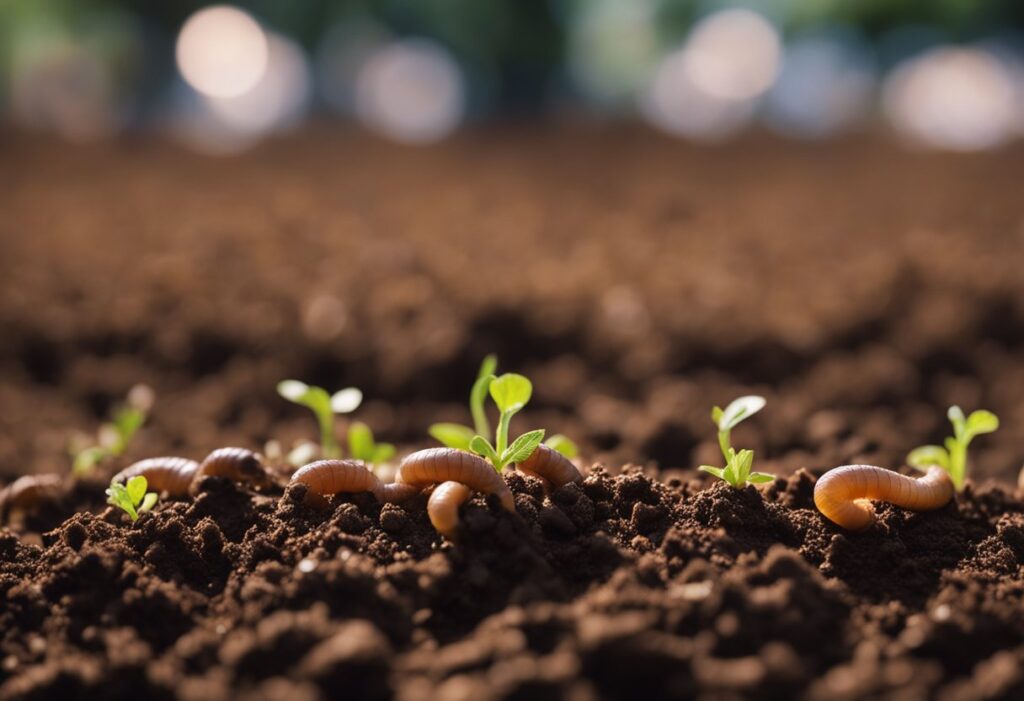Worms have long been associated with the cycle of life and death and are often seen as symbols of transformation and renewal. In many cultures, they are revered for turning dead matter into new soil capable of sustaining future generations.
But what is the spiritual meaning of worms, and what can we learn from these humble creatures?
Whether you encounter worms in your dreams, see them as spirit animals, or appreciate their role in the natural world, there is much to learn from them.
In this article, we will explore the spiritual meanings of worms and what they can teach us about life, death, and everything in between.
Key Takeaways
- Worms have long been associated with the natural cycle of life and death and are often seen as symbols of transformation and renewal.
- Historically and culturally, worms have held great significance in many spiritual beliefs and practices and have been associated with fertility, rebirth, and personal growth.
- Whether encountered in dreams, seen as spirit animals, or appreciated for their role in the natural world, worms can teach us much about life, death, and the importance of transformation and renewal.
Table of Contents
Historical and Cultural Significance

Worms have been an important symbol in various cultures and mythologies throughout history.
From Native American perspectives to Norse mythology, Chinese culture, and Hindu beliefs, worms have been revered for their transformative power and ability to turn dead matter into new soil capable of sustaining future generations.
Native American Perspectives
In Native American culture, worms were seen as a symbol of fertility and renewal. They were believed to bring new life to the soil and were often associated with the spring season. Worms were also considered a powerful symbol of spiritual growth and transformation.
Norse Mythology
In Norse mythology, the serpent Jörmungandr was said to be so large that it encircled the entire world. The serpent was often associated with the cycle of life and death and was believed to symbolize renewal and rebirth.
Worms were also seen as a symbol of the earth and were associated with the goddess Hel, who ruled over the underworld.
Chinese Culture
In Chinese culture, worms were associated with the earth element and were believed to represent the cycle of life and death. They were also seen as a symbol of fertility and were often used in traditional medicine to treat various ailments.
Hindu Beliefs
In Hinduism, worms were seen as a powerful symbol of transformation and spiritual growth. They were often associated with the god Shiva, who was believed to be the lord of the underworld and the source of all life.
Worms were also considered a symbol of the cycle of life and death and were believed to represent the idea that out of death comes new life.
Worms have played an important role in many societies’ folklore and cultural beliefs throughout history. Today, they continue to be an important symbol of renewal and transformation, reminding us of the cyclical nature of life and the power of regeneration.
Related post: The Spiritual Meaning Of Panther.
Worm Symbolism in Dreams
Have you ever had a dream about worms? Dreams about worms are not uncommon, and they can have a variety of meanings. In this section, we will explore the symbolism of worms in dreams and what they might represent.
Interpreting Worm Dreams
Dreams are often a reflection of our subconscious thoughts and emotions. When interpreting a dream about worms, it is essential to consider the context of the dream and the emotions that you experienced during the dream.
Worms in dreams can represent various things, including transformation, renewal, and decay. They can also symbolize feelings of vulnerability or fear. If you dream about worms, it may indicate that you need to confront something you have been avoiding.
Common Worm Dream Scenarios
There are several common scenarios that people dream about when it comes to worms. Here are a few examples:
- Eating Worms: If you dream about eating worms, it may indicate that you are taking in something that is not good for you. It could be a bad habit or a toxic relationship.
- Worms in Your Body: Dreaming about worms inside may signify feeling overwhelmed or burdened by something. You may need to take a step back and evaluate your priorities.
- Worms in the Soil: Dreaming about worms in the soil may symbolize growth and renewal. It could also represent the cycle of life and death.
In conclusion, dreams about worms can have a variety of meanings, and it is essential to consider the context of the dream and your emotions during the dream when interpreting it.
By understanding the symbolism of worms in dreams, you can gain insight into your subconscious thoughts and emotions and use that information to grow and improve.
Related post: The Spiritual Meaning Of Salamander.
Spiritual Meanings of Worms

Have you ever wondered what the spiritual meaning of worms is? Worms are often associated with negative connotations, but did you know they also hold great spiritual significance?
In this section, we will explore the spiritual meanings of worms and how they relate to transformation, healing, and renewal.
Transformation and Growth
One of the most common spiritual meanings of worms is transformation and growth. Worms break down organic matter and create nutrient-rich soil, supporting new growth.
This process symbolizes the cycle of life and death and the idea that out of death comes new life. Worms teach us the importance of embracing change, adapting to new circumstances, and releasing what no longer serves us.
Healing and Renewal
Worms also represent healing and renewal. They can transform waste and decay into fertile soil, supporting new life. This process symbolizes the healing and renewal of the body, mind, and spirit.
Worms teach us that there is always the potential for growth and renewal, even in the darkest times. In conclusion, worms hold great spiritual significance and can teach us valuable lessons about transformation, healing, and renewal.
By embracing the spiritual wisdom of worms, we can learn to adapt to new circumstances, release what no longer serves us, and find healing and renewal in even the darkest times.
Worms as Spirit Animals

Have you ever wondered if worms could be your spirit animal? You might be surprised to learn that they can be! Worms are often associated with transformation, resilience, and inner exploration.
In this section, we’ll explore the characteristics of the worm totem and how you can embrace worm energy in your life.
Characteristics of the Worm Totem
The worm totem is a spiritual groundskeeper, just like the snake totem. Worms are earthy creatures that live in the soil, and they help to break down organic matter and create fertile soil.
They are also associated with the element of the earth and represent the importance of staying grounded and connected to the earth.
Worms are also associated with intuition and deep insight. They teach us to trust our instincts and to listen to our inner voice. Worms are also a symbol of personal growth and transformation.
They remind us that change is a natural part of life and that we must be willing to adapt and evolve to grow.
Embracing Worm Energy
If you feel connected to the worm totem, you can embrace worm energy in your life in several ways. Here are a few ideas:
- Spend time in nature: Walk in the woods or your garden. Connect with the earth and observe the natural world around you.
- Practice meditation: Meditation can help you connect with your inner self and tap into your intuition. Sit quietly and focus on your breath, or try a guided meditation.
- Embrace change: Remember that change is a natural part of life and can lead to personal growth and transformation. Be open to new experiences and opportunities.
- Release what no longer serves you: Just as worms break down organic matter, you can release old habits and patterns that no longer serve you. Let go of what is holding you back and embrace new possibilities.
By embracing worm energy, you can tap into your intuition, embrace personal growth, and stay grounded and connected to the earth.
Life Lessons from Worms

Worms may seem insignificant, but they hold great spiritual significance in many cultures. These creatures can teach us valuable life lessons about humility, resilience, determination, and adaptability.
This section will explore some of the most important life lessons from worms.
Humility and Grounding
Worms spend their entire lives in the soil, breaking down organic matter and creating nutrient-rich soil to support new growth. They are constantly grounded, reminding us of the importance of staying humble and connected to the earth.
When we feel overwhelmed or stressed, taking a cue from the worms and spending time in nature can be helpful. By connecting with the earth and grounding ourselves, we can gain a new perspective and feel more centered and calm.
Resilience and Adaptability
Worms are incredibly resilient creatures. They can survive in various environments, from harsh deserts to damp forests. They are also incredibly adaptable, able to adjust to changes in their environment and find new ways to thrive.
As humans, we can learn a lot from the resilience and adaptability of worms. When we face challenges or setbacks, we can take inspiration from these creatures, find new ways to overcome obstacles and keep moving forward.
In conclusion, worms may seem like small and insignificant creatures, but they can teach us valuable life lessons about humility, resilience, determination, and adaptability. By taking inspiration from these creatures, we can learn to live more grounded, connected, and resilient lives.
Worms and the Natural Cycle

Worms play an essential role in the natural cycle of life. They are often associated with decomposition, nourishment, and the circle of life. In this section, we will explore the significance of worms in the natural cycle and how they contribute to the ecosystem.
Decomposition and Nourishment
Worms are known for their ability to break down organic matter in the soil. They feed on dead leaves, grass, and other plant material, which they digest and excrete as nutrient-rich castings. These castings are an excellent source of nourishment for plants and help to enrich the soil.
Worms also play a crucial role in the decomposition process. They help to break down dead animals and other organic matter, which contributes to the nutrient cycle in the soil.
Without worms, the soil would become compacted, and the nutrients would not be available for plants to absorb.
Renewal and the Circle of Life
Worms are a symbol of renewal and the circle of life. They represent the idea that out of death comes new life.
When worms break down organic matter, they release nutrients into the soil, which helps to support new growth. This process is essential for the survival of plants and other living organisms.
The earthworm is one of the most common worms found in soil. It is known for its ability to burrow through the soil, which helps to aerate the soil and improve its structure.
This, in turn, helps promote healthy plant growth and contributes to the ecosystem’s overall health.
In conclusion, worms are an essential part of the natural cycle of life. They play a crucial role in decomposition, nourishment, and the circle of life. Without worms, the soil would become compacted, and the nutrients would not be available for plants to absorb.
So, the next time you see a worm, remember its significance in the ecosystem and appreciate its contribution to the natural world.
Practical Implications of Worm Symbolism

Worms are fascinating creatures and have practical implications for our lives. This section will explore how we can apply worm symbolism to our daily lives.
Vermicomposting and Agriculture
Worms play a crucial role in vermicomposting, a composting method involving using worms to break down organic waste. Vermicomposting is an excellent way to reduce waste and produce nutrient-rich soil for plants.
We can create a sustainable waste reduction and soil enrichment cycle using worms for composting.
Furthermore, using worms in agriculture can help improve soil quality and reduce the need for chemical fertilizers. Worm castings, the excrement produced by worms, are rich in nutrients and can help improve soil structure, moisture retention, and fertility.
By incorporating worms into agricultural practices, we can promote a more sustainable and environmentally friendly approach to farming.
Environmental Impact
Worms are essential for maintaining the balance of ecosystems. They play a vital role in breaking down organic matter and returning nutrients to the soil, supporting plant growth and other organisms.
Without worms, ecosystems would struggle to maintain their delicate balance, and the environment’s health would suffer.
By recognizing the importance of worms in the environment, we can take steps to protect them and their habitats. For example, we can avoid using pesticides and other chemicals that harm worms and other beneficial organisms.
We can also support conservation efforts that aim to protect the habitats of worms and other important species.
In conclusion, worm symbolism has practical implications for our daily lives. By incorporating worms into our composting and agricultural practices and recognizing their importance in maintaining the balance of ecosystems, we can promote a more sustainable and environmentally friendly approach to living.







